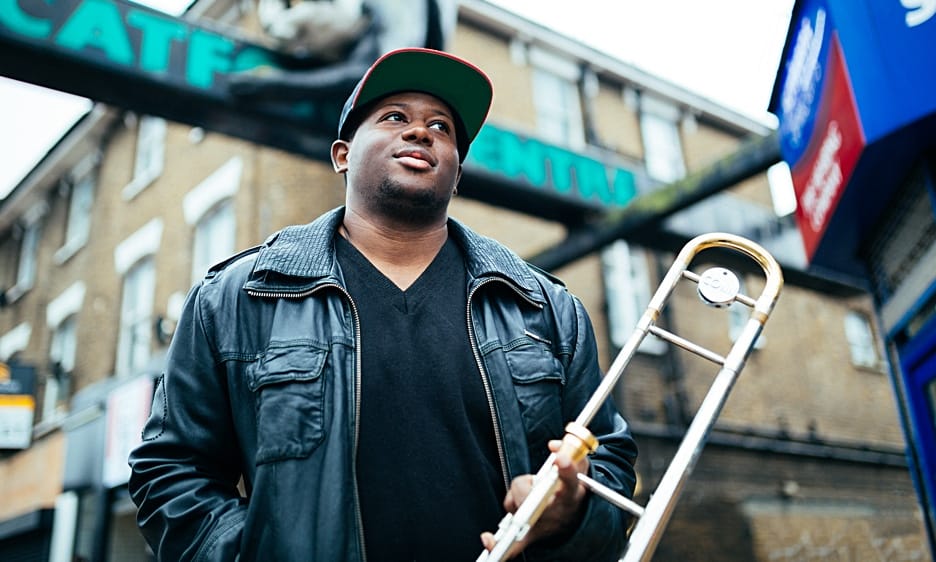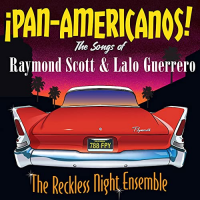Home » Jazz Articles » Interview » Nathaniel Cross: Deep Vibrations
Nathaniel Cross: Deep Vibrations

Wayne ShorterЎҜs debut album still blows me away now. It tells a story and understanding the importance of that helped me take my own writing up a level. The know-how is there and the emotional intelligence is also there. ItЎҜs like a perfect balance of left brain and right brain. WayneЎҜs music hits me on a deep level.
—Nathaniel Cross
One such under-recognized musician is the trombonist, composer and arranger

Nathaniel Cross
trombone
Moses Boyd
drums
Zara McFarlane
vocalsMacy Gray
vocals
Quincy Jones
arranger1933 - 2024

Theon Cross
tuba
Sons of Kemet
band / ensemble / orchestraHappily, this may be about to change. In June 2021, Cross released his own name debut, the 30-minute, four-track EP The Description Is Not The Described (First Word). It may have been some time coming, but it is a blinder, packed with uplifting music which, in trademark London style, augments its jazz foundation with dashes of other music, including calypso, Afro-Cuban, hip hop and broken beat.
The disc's title is inspired by one of philosopher Jiddu Krishnamurti's maxims. Cross chose it because he feels it reflects the state of the world in 2021. "So many of us are caught up in labels and descriptions that we end up looking at people for what they are, rather than embrace them for who they are," he says. "No matter how detailed the description is, it will never capture the essence."
Opening track "Goodbye For Now" is dedicated to Cross' late father, who passed in March 2020 at a tragically young age. Its opening bars reference the signature ostinatos of

John Coltrane
saxophone1926 - 1967

Pharoah Sanders
saxophone, tenor1940 - 2022
As the track titles suggest, Cross is widely read. It has to be more than a coincidence that the same is true of his formative influence as a composer,

Wayne Shorter
saxophone1933 - 2023

Weather Report
band / ensemble / orchestraAlan Shorter
flugelhornCross started playing trombone at primary school when he was ten years old. "I didn't choose it," he says. "It was assigned to me by the music teacher. There was a cupboard full of old brass instruments which had been left behind by a military band who once rehearsed there. Rather than throw them away, they hired a trumpet player to come and teach us."
When he was 13, Cross started attending band practice with Kinetica Bloco. A combination marching band and community outreach project, Kinetica Bloco was founded in 2000 by the inspirational teacher and multi-instrumentalist Mat Fox. It took its cultural influences not from Western traditions but from Africa, the Caribbean, South America and New Orleans. Many of the musicians on London's 2021 alternative jazz scene have passed through Kinetica, just like they have passed through the Tomorrow's Warriors band and outreach project founded in 1991 by two other inspirational figures, bassist

Gary Crosby
bass, acousticb.1955
"Kinetica was a really important part of my learning music and enjoying it more," says Cross. "Until I joined, my music education was all about getting through my grades. Andy Grappy, a tuba player who was a mentor for me and Theon, came to our school to talk about Kinetica and what they were about. He and Mat Fox had a gift for making music engaging for kids. Before Kinetica I was just playing classical excerpts and scales and so forth. Important stuff but not a lot of fun, and to be honest, I wasn't enjoying it that much. But Mat introduced us to

Fela Kuti
saxophone1938 - 1997

Sun Ra
piano1914 - 1993
"Andy could see I was serious so he told my Dad about Tomorrow's Warriors. I started with them when I was fourteen. Classes were every other Sunday back then. It was about jazz and learning about improvisation. Kinetica was more like world music, different cultures and folk songs. Both organisations have been incredibly important parts of my development as a musician and generally as a person."
Cross also studied jazz trombone at the Guildhall School of Music and Drama, starting there in 2009 and graduating in 2013.
Compared with the trumpet or the saxophone, the valve trombone has not produced a great number of players for young musicians to use as role models; this is probably for the simple reason that it is a relatively difficult instrument to master. "" data-original-title="" title="">J J Johnson was my first influence," says Cross. "He was one of the great innovators on jazz trombone. I didn't really like the trombone that much when I first started. Then Andy Grappy told me to listen to J.J. It was like, wow! I thought it sounded amazing. He had amazing technique and great articulation and could play cleanly at very fast tempos. So I spent my early years just trying to copy him. He gave me a reference about how the trombone is meant to sound and opened up a new world for me.
"Later, one of my biggest influences was Wayne Shorter. He's such a well-rounded musician, compositionally, harmonically, his arrangements. And he doesn't just play licks; whatever he plays tells a story. Studying his compositions has taught me so much about harmony and melody."
Another big influence on Cross, and the alternative London jazz scene in general, has been the specificity and diversity of cultural heritage. "This is fundamental to modern British jazz," says Cross. "An African American is just an African American. But in Britain, you know if your heritage is Caribbean or African and from which island or which country. You know you're Black British from Dominica or Barbados or Ghana or Nigeria, wherever. That gives us more cultural reference points. Like my mother's parents were from St. Lucia and my father's parents were from Jamaica. So I grew up hearing a lot of records from the islands: reggae, ska, soca, calypso. Because we have direct connections to the islands or the countries in Africa, it allows us to import those influences into the music, to tap into different sources. And then just growing up in London, hearing grime, hearing sound systems. All those things come into my music."
Which brings us back to The Description Is Not The Described and the origins of that title. "I like Krishnamurti because he doesn't ever come on holier than thou," says Cross. "He's really straightforward. I went through a period of reading a lot of his writings when I was 19, 20. It helped me a lot, gave me more balance in life, it put the world into perspective. With Krishnamurti, everyone is on the same level, a human level, it's not about cultures or races or whatever. It's about human consciousness, humanity in general."
Another thinker who has made a deep impression on Cross and who is referenced on the record is the psychoanalyst Carl Jung. "He had this poem which goes 'Who looks outside dreams; who looks inside awakes,'" says Cross. "It's all about how you can find greatness within yourself. I thought it made a great title for the last track. It could apply to people who seek validation from the number likes they get on social media, but of course Jung was around long before we had social media. He was talking about how you live your life in general. Like with people who judge their success on the number of women they attract, or the number of men. Jung was saying that what you really need to do to understand yourself is to look within yourself.
"The tune itself is actually based on a Wayne Shorter composition called 'Sleeping Dancers Sleep On.' While I was writing 'Who Looks Inside, Awakes' I was playing Wayne's chords for that tune. I made a few adjustments here and there but it's based on Wayne's changes. It gave me the idea of borrowing Jung's saying for the song title."
Two other tracks—"Light In The Darkness" and "Charge It To The Game"—are borrowed from more widely known sayings. "Martin Luther King Jr. said, 'Only in the darkness can you see the stars,'" says Cross. "He meant that with too much darkness you're blind, but with too much light you're also blind." The expression "Charge It To The Game" is a popular expression meaning that if something unfortunate happens to you, put it down to experience and move on.
Did Cross write the record's remaining track, "Goodbye For Now," in memory of his father? "I actually wrote it a few years ago," says Cross. "But when I was finishing the EP, my father passed away so it gave the title a deeper meaning. And after he passed away, and we were clearing out where he was living, I found a bag of cassettes. Some of them were music from his old band. He'd played guitar and sung with a reggae band called Nyansis. Then I found a cassette he'd made of me and him talking when I was a very young child. I thought 'I've got to put that on the track.' So I just put a little extract on the record, to pay homage to him."
Cross' father is referenced again in the six album choices which follow. Cross chose these albums because they track his progress in becoming a musician. He lists them in more or less the order in which he came across them.
NATHANIEL CROSS: SIX SEMINAL ALBUMS
 J.J. Johnson
J.J. Johnson The Eminent J.J. Johnson Vol. 2
Blue Note, 1955
J.J. was my introduction to jazz and he's been my biggest influence playing jazz on the trombone. I first heard him when I was 14, and he started me on my journey. I've chosen this particular album because it was the first J.J. album I bought and I listened to it constantly. I can still remember going to the shop and buying it. There's no other horn, just J.J.,

Wynton Kelly
piano1931 - 1971

Charles Mingus
bass, acoustic1922 - 1979

Kenny Clarke
drums1914 - 1985

Sabu Martinez
congas1930 - 1979
 Art Blakey's Jazz Messengers
Art Blakey's Jazz MessengersUgetsu
Riverside, 1963
This is a great recording of a gig at Birdland. It's another album I bought early on. The vibe of it, the ensemble work, the compositions, it all just blew me away.

Curtis Fuller
trombone1934 - 2021

Art Blakey
drums1919 - 1990
 Wayne Shorter
Wayne ShorterIntroducing Wayne Shorter
Vee Jay, 1960
Listening to compositions Wayne wrote for other people's albums, the Messengers or

Lee Morgan
trumpet1938 - 1972
 The RH Factor
The RH FactorHard Groove
Verve, 2003
For younger generations of musicians like mine,

Roy Hargrove
trumpet1969 - 2018

Erykah Badu
vocalsb.1971
 Bob Marley
Bob MarleyRastaman Vibration
Island, 1976
This brings back memories for me. I'm old enough to have had a cassette player, and my father would often burn cassettes for me. If I was going on a school trip, Dad would burn me some cassettes for the journey. This was one he burnt for me when I was going on a trip to France. I think it was one of the first

Bob Marley
guitar1945 - 1981
 Moacir Santos
Moacir SantosCarnival Of The Spirits
Blue Note, 1975
This is a more recent one for me. I only got it a couple of years ago. I discovered it through Akwasi Mensah, who was helping me with my EP in the early stages. He's with IG Culture and Kaidi Tatham, those broken beat guys. Akwasi was playing me a lot of music I didn't know. He's one of those guys who knows a lot of different music from all over the place. One of the albums he played me was this one by

Moacir Santos
composer / conductor1926 - 2006
Tags
Comments
PREVIOUS / NEXT
Support All About Jazz
 All About Jazz has been a pillar of jazz since 1995, championing it as an art form and, more importantly, supporting the musicians who make it. Our enduring commitment has made "AAJ" one of the most culturally important websites of its kind, read by hundreds of thousands of fans, musicians and industry figures every month.
All About Jazz has been a pillar of jazz since 1995, championing it as an art form and, more importantly, supporting the musicians who make it. Our enduring commitment has made "AAJ" one of the most culturally important websites of its kind, read by hundreds of thousands of fans, musicians and industry figures every month.





 Buy Now
Buy Now























